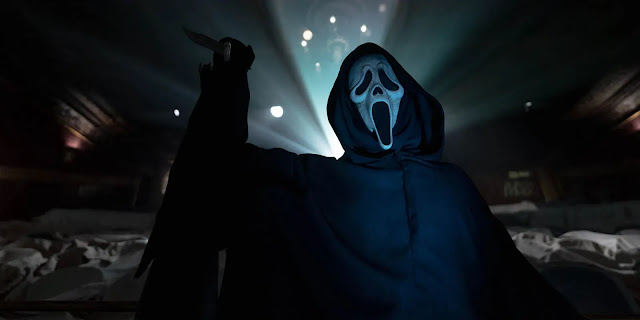Profiling Ghostface in Scream 6
I've been sitting on this post for a while because as a Scream fan, I want to be able to discuss it in ways that really get to the meat of the story instead of just writing a review. I saw it in 3D before its official release weekend, and I even have the exclusive Scream 6 poster that was handed out as part of the premiere. My opinion is that if I'm still excited about a film AFTER I watch it, then it's a really good film--that's Scream 6 for me. Naturally, I will be getting this title on Blu-ray and watching this movie again to look for the clues I missed the first time.
Since the release of Scream 6, there has been plenty of fan chatter about the about the identity of the Ghostface killer in the sequel and if it lives up to other identity reveals that happened in previous entries. This post is my two cents about the reveal, why I think it works in ways that might not be immediately obvious upon initial viewing. Naturally, there will be HUGE spoilers here.
In my opinion, the most effective Ghostface reveals happen when the killer has a direct emotional connection to Sidney Prescott or Sam Carpenter, the franchise's two main protagonists. As such, I found the reveals involving Billy Loomis, Jill Roberts and Richie Kirsch to be the most impactful, because they add an extra layer of shock and betrayal to what would otherwise could be an indifferent killing spree. The Scream 6 killers don't have an emotional connection to Sam, but instead to Richie Kirsch from Scream 5--Richie's father and two siblings are behind the Ghostface mask here, namely Wayne Bailey and his two kids Quinn and Ethan. Wayne is a police officer with the NYPD who pretends to help Sam find the latest Ghostface killer, while Quinn and Ethan each found ways to get closer to Sam, her sister Tara, and the Meeks-Martin twins Chad and Mindy by the time the Ghostface killings in New York begin.
With the motive of Scream 6 focusing on revenge against a "final girl" who killed a previous Ghostface killer, there are some similarities between the Baileys and Nancy Loomis in Scream 2. But what makes the latest Ghostface very different from the others is Wayne Bailey himself--he's a deeply corrupt cop, a character type you're much more likely to see in a crime drama or film noir than a slasher movie. (I guess you can say that Wayne is now the official maniac cop of the Scream franchise.) I'll be the first to admit that this didn't fully sink in when I first saw Scream 6, but it gave me plenty of food for thought in the days since.
When looking back at the many clues dropped in Scream 6, Wayne Bailey has obviously been a corrupt cop for a very long time. Even though Wayne doesn't lay out the specifics of his corruption in a monologue, the film makes it clear that he's adept at abusing his role in law enforcement. By the time of the sequel, it would make sense that Wayne has had plenty of experience with planting evidence, making evidence disappear, spreading misleading information to sway public opinion about a criminal case, and hiding bodies. He helped Richie build a massive shrine to the Ghostface killings that spawned the Stab franchise, and he specifically says how it was possible to get evidence for the previous Ghostface murders to be part of the shrine when Sam, Tara and the others see it for the first time. Furthermore, if Richie knew about his dad's corrupt behavior, it makes sense that Quinn and Ethan knew about it too and why they were onboard with the revenge plot against Sam. There's a reason why the killings in Scream 6 are more brutal than those in the previous movies--this Ghostface has actually trained with weapons, and probably taught his kids a few things about brutality well before the death of Richie.
Given the previous films' commentaries about the complicated relationship between violence, the media and "true crime" sensationalism, I'm surprised that we haven't had some kind of commentary about law enforcement and public perceptions of criminal violence in the Scream movies until now. Sure, there are characters like Dewey Riley, Mark Kincaid and Judy Hicks, but their roles in the Scream movies follow the more conventional purpose of police officers within a slasher film: to stop the killer (even if cops in slasher movies rarely do).
It's not hard to find sites that sell murderabilia, items connected to actual serial killers and their crimes--just enter "crime collector" into any search engine and you'll see what I mean. There's even a Museum of Death, which has locations in Los Angeles and New Orleans. According to Wikipedia, "The museum displays a wide variety of art and artifacts surrounding the subject of death. Baby coffins are in one section, letters and artwork from various serial killers in another. There are films regarding autopsies as well as explicit photographs of crime victims." I'm sure that the Ghostface shrine was meant to be part of the sequel's commentary about horror franchises, but it's hard to overlook the plot point of a corrupt cop (ab)using his knowledge of criminal evidence processing to enable his son's twisted obsession with a succession of serial killings.
There's also the matter of how Wayne Bailey and his kids go about their plan of revenge, as if there is some kind of entitlement behind it. It's not just because Sam killed a member of their family; it's also that their connection to law enforcement somehow gives them the right to seek vengeance against someone who has a connection to a notorious serial killer. Of course, such as sense of entitlement would permeate Wayne Bailey's history of corruption, that he believes he's allowed to manipulate the law as he sees fit BECAUSE he is a cop, so I could see how enraged he would get when his eldest son is killed by someone as undeserving and inferior as a daughter of a violent criminal. I don't know whether the creative team behind Scream 6 meant for the Bailey family to serve as a commentary about recent real-world incidents of police corruption and brutality but it's something to consider, kind of like how Scream 3 was a commentary about sexual abuse in Hollywood that went unnoticed by Harvey Weinstein himself.
I love the Scream franchise because these films have been made by intelligent people who have something interesting to say through the use of horror tropes and Scream 6 continues this tradition in ways that are unique to the series and compelling in its own right. Hopefully, Scream 7 will be just as intriguing and insightful as well.






full of horror
ReplyDelete